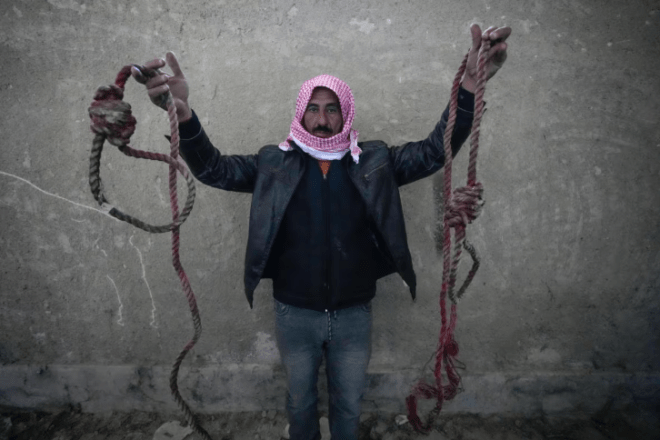
Having survived 19 months in detention, enduring battery, torture and sexual assault to extract a confession of terrorism, he was finally released in 2012 by an anti-terrorism court. He testified to the brutality of the Asaad regime and was aware that the intelligence services still considered him a danger. Whilst he sought political asylum in the Netherlands, the physical injuries and psychological isolation, combined with his mental anguish at the ongoing struggle of his countrymen, led him to return to Syria in an effort to assist others to find freedom. As the civil war turned and Asaad had turned scurrying rat, Mazen was found dead on 9 December 2024 at Sednaya Prison. Images show an emaciated man, but not decomposed. He had clearly died only recently.
Thirteen, that unlucky number, marks the turn of the years since the Arab Spring was brutally crushed in Syria. The subsequent revolution and descent into civil war fractured the country into multiple warring factions that President Bashar al-Asaad suppressed in the most brutal of fashions. The Syrian regime pursued activists across international boundaries, people such as Mazen al-Hamada, arrested for filming protests during the Damascus Spring and sourcing formula for babies.
Reports of filth and torture inflicted on detainees in Sednaya are second only to the parting barbarity of the retreating regime who destroyed electronic mechanisms controlling access to the cells. The result is hundreds of political prisoners imprisoned without access to food or water even as the liberators have chased the despot out of the country. Detainees beyond reach who would die within days of hunger and thirst. And whilst up to 25,000 prisoners have been released in the past few days, tens of thousands remain missing.
The retreating tyrannical regime locked down the prisoners as tightly as the Central Bank of Syria, which although freely and rapidly looted of some cash immediately fleeing the liberation of Damascus, remained largely intact as the vaults were untouched. In fleeing, Asaad was malicious to the last prisoner and the last lira and he undoubtedly departed with much of Syria’s wealth secured in some foreign bank.
The images coming from Sedanya of emaciated bodies, masses of clothing and shoes are reminiscent of those of the concentration camps at the end of World War II. The Slaughterhouse as Sedanya has been dubbed by locals, has bared its secrets to liberating forces with bodies found in ovens, bones discarded, detainees who have gone insane. One video shows individuals, hands tied behind their backs, forced to walk over a jagged ledge into a deep pit of bodies, one after the other. As they fall, they are shot. Not all the bodies in the pit are dead – the odd one moves, but not for long as more bullets are fired. It is horrific.
The gross atrocities perpetrated by a despot such as Asaad should not go be ignored and nor should they be brushed aside in Australia. Rather than the humanism the world so desperately needs, Western nations look on silently, ignoring the repetition of history by a fallen megalomaniac, saying nothing and doing less. Because the victims are brown, because they are not Christian … or Jewish.
The world knew that Asaad was a bully and a tyrant, too weak to rule without the brutality of a vicious army behind him. Innumerable refugees told us so. And as the western world prepares to deport those who escaped to seek asylum, the prisoners lost to Sednaya Prison’s lowest levels remain no closer justice. A register discovered lists 29,000 victims of the Asaad regime, 29,000 people who will never go home, many who whose bodies will never be found. And the world ignores the man responsible, hiding behind the skirts of his Russian benefactor. It’s depraved. All of it. We can decry what’s going on in Syria as barbaric, it’s not so long ago that the same was done to the Jews in Europe by a supposed Christian. Religion does not treat others so appallingly – people do. To fail to hold the villains to account on all sides is to accept our own bias.
No man is an island. Much as some would argue otherwise, we are all a part of the great human species. Any man’s abuse, marginalisation, death diminishes us all. The shifting hands of power may have moved on from Asaad, but the legacy he leaves is abhorrent. The past century should have taught us that humanity does not automatically confer humanism. That will only come when we confront the horror repeating itself less than a century on from that in Europe. Confront it so that we recognise and act to speak up for those in desperation and need in future, regardless of the culture, creed or colour of those affected. To fail to do so is to consign humankind to hear the tolling bell again and again and again.


